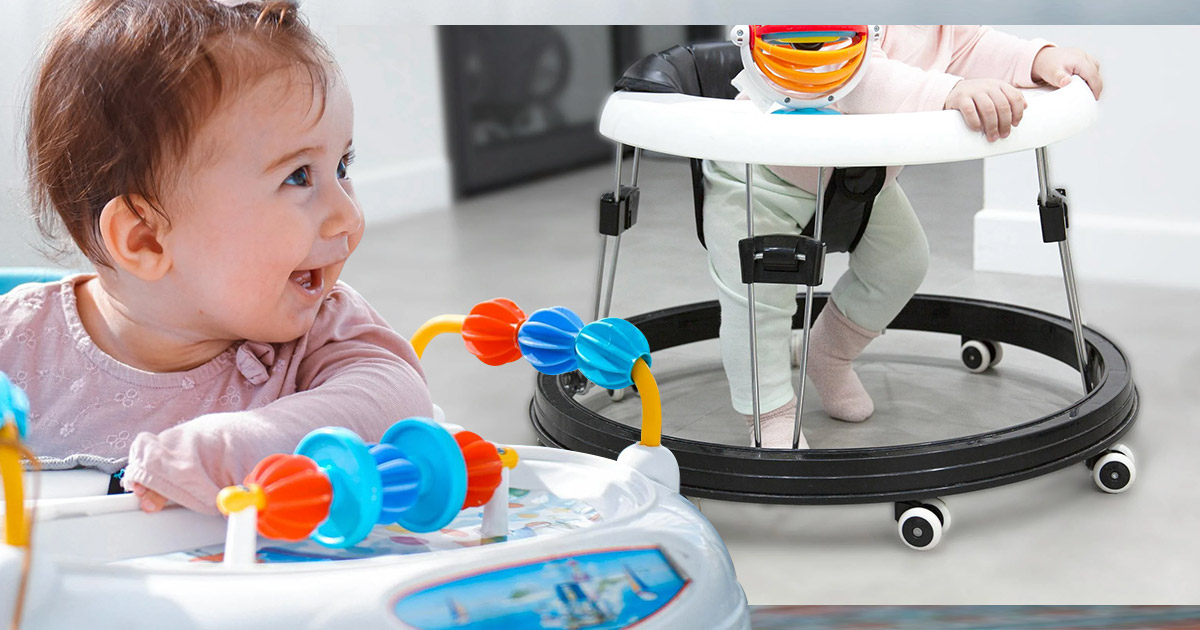Why Baby Walkers Could Be Risky for Babies

Baby walkers might seem like a great tool to help your little one move around and explore. However, these devices come with significant risks that every parent should understand. From safety concerns to developmental delays, it’s essential to know why they’re not the best option for your baby’s growth.
The Hidden Dangers of Baby Walkers
Baby walkers allow infants to move quickly, often faster than they can control. This mobility can lead to accidents, like falling down stairs or reaching dangerous areas like kitchens or bathrooms. Studies show that many injuries related to walkers involve head trauma or burns from tipping over hot items. Walkers are particularly risky because they give babies access to spaces that are typically out of reach, increasing the likelihood of hazards.
Do Walkers Delay Walking in Babies?
Contrary to popular belief, walkers don’t teach babies to walk. In fact, they can delay important motor milestones. The support provided by walkers allows babies to move without engaging the muscles needed for walking, standing, or balancing. This lack of natural practice can slow the development of key skills. Research suggests that babies who use walkers might take longer to crawl, stand, or walk on their own.
What Baby Walkers Do (and Don’t Do) for Development
Walkers may seem helpful at first glance, but they’re not beneficial for motor skill development. Let’s break down the facts:
- Encourage Improper Posture: Walkers position babies in an unnatural posture, forcing them to lean forward rather than stand upright. This can hinder the development of proper walking mechanics.
- Limit Natural Exploration: Babies learn through hands-on exploration and crawling. Walkers restrict these opportunities by confining their movement.
- Create Dependency: The artificial support provided by walkers can lead to dependence, making it harder for babies to learn how to balance and walk independently.
- Delay Motor Skills: Instead of strengthening muscles, walkers encourage passive movement, which can delay the development of strength and coordination.
Why Parents Still Use Walkers
Parents often choose walkers for convenience or entertainment. Here’s why they remain popular:
- Perceived Benefits: Many believe walkers help babies learn to walk sooner.
- Entertainment Value: Walkers keep babies entertained with built-in toys and mobility.
- Tradition: Some parents use walkers because they’ve been a common baby item for generations.
Unfortunately, these reasons overlook the potential risks and developmental drawbacks.
Safer Alternatives to Baby Walkers
For parents looking for safe options to support their baby’s development, here are some great alternatives:
- Stationary Activity Centers: These provide the same entertainment as walkers but without the mobility risks.
- Play Mats: Encourage tummy time and crawling, both essential for motor skill development.
- Push Toys: These allow babies to practice standing and walking while offering support.
- Floor Time: Simply letting your baby explore in a safe environment promotes natural development.
- Bouncers or Jumpers: While not ideal for long periods, they can offer short bursts of entertainment.
Baby Development and Safety Guidelines
Understanding the connection between baby walkers and development involves looking at the bigger picture. Here’s what you should know:
The Role of Motor Skills in Growth
Motor skills, including crawling and walking, are critical milestones that form the foundation for physical and cognitive growth. Babies develop these skills naturally through trial and error—not by using devices like walkers.
Expert Recommendations
Pediatricians and child development experts universally recommend against using walkers. They emphasize the importance of natural exploration and supervised play as safer, more effective ways to support growth.
Common Misconceptions
Some parents think walkers are a shortcut to helping their child walk, but this is a myth. Walkers can hinder progress by bypassing essential developmental stages.
The Impact of Baby Walkers on Safety
Increased Risk of Accidents
Babies in walkers move faster than they can safely navigate, leading to a higher risk of falls, burns, and other injuries. Stairs are particularly hazardous, even with gates.
Challenges with Supervision
Walkers make it harder for parents to keep up with their baby’s movements, increasing the risk of unsupervised accidents.
Legal and Regulatory Actions
Some countries have banned baby walkers due to safety concerns, while others have introduced strict safety standards to reduce risks.
How to Encourage Walking Naturally
Walking is a significant milestone, and there are better ways to support your baby’s journey:
Floor Time and Tummy Time
Allowing your baby to play and explore on the floor helps build the muscles needed for crawling and walking.
Encourage Crawling
Crawling is an essential precursor to walking. Create a safe space for your baby to move and explore freely.
Use Push Toys
Push toys offer the support babies need while practicing balance and coordination.
Celebrate Small Steps
Every milestone is worth celebrating, even if it’s just standing for a few seconds. Positive reinforcement encourages your baby to keep trying.
Be Patient
Every baby develops at their own pace. Providing a safe and supportive environment is more important than rushing milestones.
Choosing the Right Path for Your Baby
Helping your baby grow and develop is a rewarding journey, and choosing the right tools and methods is crucial. By understanding the risks associated with baby walkers and exploring safer alternatives, you’re setting your little one up for success.
Safer Choices Lead to Happier Babies
Baby walkers might seem like a helpful tool, but the risks far outweigh the benefits. They can delay walking, pose safety hazards, and hinder natural development. Instead, focus on safer alternatives like push toys, activity centers, and plenty of floor time to encourage your baby’s growth. Remember, the best way to support your baby’s milestones is through patience, love, and a safe environment. Every step they take is worth celebrating—without the need for a walker.

